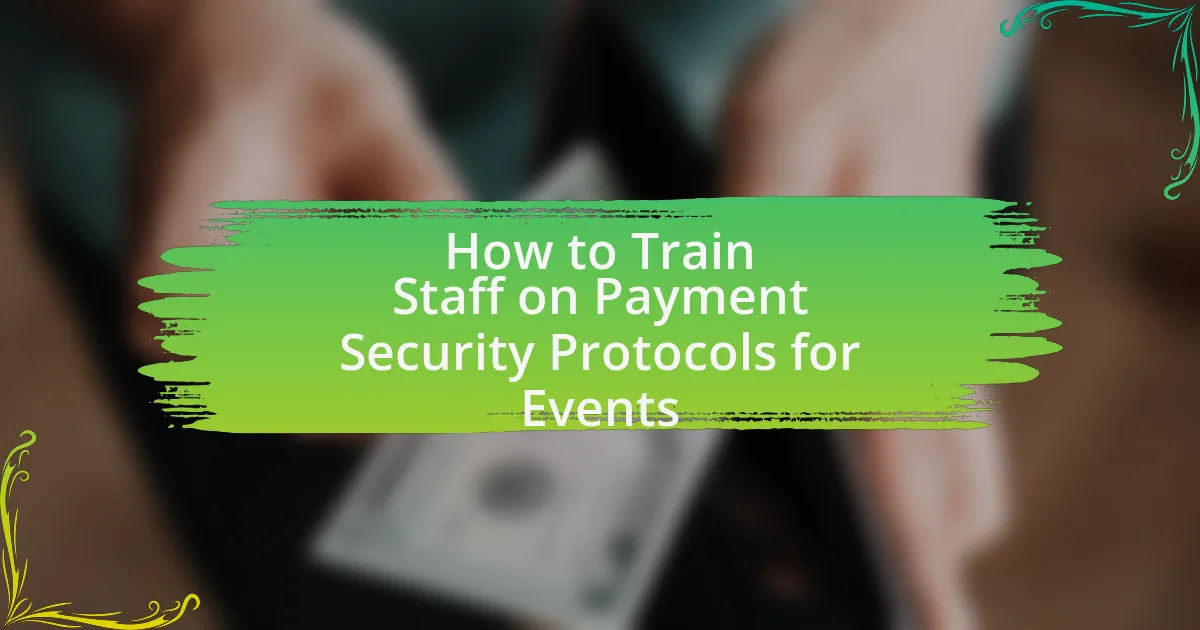The article focuses on best practices for securing online ticket sales against fraud, emphasizing the importance of implementing strong authentication measures, secure payment gateways, and continuous transaction monitoring. It outlines methods for identifying potential fraud, such as advanced data analytics and recognizing common signs of fraudulent activity, including unusually low prices and high-pressure sales tactics. The article also discusses the legal implications of ticket fraud, the impact on customer trust, and the technologies that can enhance security, such as encryption and multi-factor authentication. Additionally, it provides practical tips for businesses to mitigate risks and recover losses from fraudulent activities.
What are the Best Practices for Securing Online Ticket Sales Against Fraud?

The best practices for securing online ticket sales against fraud include implementing strong authentication measures, utilizing secure payment gateways, and monitoring transactions for suspicious activity. Strong authentication, such as two-factor authentication, significantly reduces the risk of unauthorized access, as it requires users to provide additional verification beyond just a password. Secure payment gateways encrypt sensitive information, protecting customer data during transactions, which is crucial given that 43% of cyberattacks target small businesses, according to the Verizon 2021 Data Breach Investigations Report. Additionally, continuous monitoring of transactions can help identify and flag unusual patterns, allowing for prompt investigation and action against potential fraud.
How can businesses identify potential fraud in online ticket sales?
Businesses can identify potential fraud in online ticket sales by implementing advanced data analytics and monitoring transaction patterns. By analyzing user behavior, such as unusual purchasing frequency or high-value transactions from new accounts, businesses can flag suspicious activities. Additionally, utilizing machine learning algorithms can enhance detection capabilities by recognizing patterns indicative of fraud, such as the use of stolen credit cards or mismatched billing information. According to a report by the Federal Trade Commission, online ticket sales fraud has increased significantly, highlighting the need for robust fraud detection systems.
What are the common signs of fraudulent activity in ticket sales?
Common signs of fraudulent activity in ticket sales include unusually low prices, lack of verifiable seller information, and high-pressure sales tactics. Unusually low prices often indicate that the tickets may be counterfeit or stolen, as legitimate sellers typically price tickets according to market value. Lack of verifiable seller information, such as a physical address or contact details, raises red flags about the seller’s legitimacy. High-pressure sales tactics, where sellers urge buyers to act quickly, can suggest that the seller is trying to prevent buyers from conducting due diligence. These indicators are supported by reports from organizations like the Better Business Bureau, which highlight that many scams involve these tactics to exploit unsuspecting consumers.
How can data analytics help in detecting fraud?
Data analytics can significantly aid in detecting fraud by analyzing patterns and anomalies in transaction data. By employing techniques such as machine learning algorithms, organizations can identify unusual behaviors that deviate from established norms, such as sudden spikes in ticket purchases or multiple transactions from the same IP address. For instance, a study by the Association of Certified Fraud Examiners found that data analytics can reduce fraud detection time by up to 80%, highlighting its effectiveness in uncovering fraudulent activities quickly and accurately.
Why is it important to secure online ticket sales?
Securing online ticket sales is crucial to prevent financial loss and protect consumer data. Fraudulent activities, such as credit card theft and ticket scalping, can lead to significant revenue losses for businesses and compromise the personal information of customers. According to a report by the Better Business Bureau, online ticket fraud has increased by over 50% in recent years, highlighting the urgent need for robust security measures. Implementing secure payment gateways and encryption protocols can mitigate these risks, ensuring a safe transaction environment for both sellers and buyers.
What are the consequences of fraud in ticket sales for businesses?
Fraud in ticket sales leads to significant financial losses for businesses, damaging their revenue and profitability. According to a report by the Better Business Bureau, ticket fraud can result in losses exceeding $1 billion annually in the United States alone. Additionally, businesses face reputational harm, as customers may lose trust and choose not to purchase from them again. This erosion of customer confidence can lead to long-term declines in sales and market share. Furthermore, legal consequences may arise, including lawsuits and regulatory fines, which can further strain financial resources.
How does fraud impact customer trust and loyalty?
Fraud significantly undermines customer trust and loyalty by creating a perception of insecurity and unreliability in transactions. When customers experience fraud or perceive a risk of fraud, they are less likely to engage with a business, leading to decreased repeat purchases and negative word-of-mouth. Research indicates that 70% of consumers would stop purchasing from a brand they believe is vulnerable to fraud, highlighting the direct correlation between fraud incidents and customer retention. Additionally, a study by the Ponemon Institute found that companies experiencing data breaches lose an average of 3.5% of their customer base, further illustrating the detrimental effects of fraud on customer loyalty.
What technologies can enhance security in online ticket sales?
Technologies that can enhance security in online ticket sales include encryption, tokenization, multi-factor authentication (MFA), and artificial intelligence (AI) for fraud detection. Encryption protects sensitive data during transmission, ensuring that personal and payment information remains confidential. Tokenization replaces sensitive data with unique identifiers, reducing the risk of data breaches. Multi-factor authentication adds an extra layer of security by requiring users to verify their identity through multiple methods, such as SMS codes or biometric verification. AI algorithms analyze transaction patterns to identify and flag potentially fraudulent activities in real-time, significantly reducing the likelihood of fraud. These technologies collectively strengthen the security framework for online ticket sales, making transactions safer for consumers.
How do encryption and secure payment gateways work?
Encryption and secure payment gateways work by protecting sensitive data during online transactions. Encryption transforms data into a coded format that can only be read by authorized parties, ensuring that personal and financial information remains confidential. Secure payment gateways facilitate the transfer of this encrypted data between the customer, the merchant, and the payment processor, using protocols such as SSL (Secure Socket Layer) to create a secure connection. This process prevents unauthorized access and fraud by ensuring that data is transmitted securely over the internet. According to a report by the Payment Card Industry Security Standards Council, implementing encryption and secure payment gateways significantly reduces the risk of data breaches and fraud in online transactions.
What role does two-factor authentication play in securing transactions?
Two-factor authentication (2FA) significantly enhances the security of transactions by requiring users to provide two distinct forms of identification before access is granted. This process typically involves something the user knows, like a password, and something the user possesses, such as a mobile device that receives a verification code. By implementing 2FA, the risk of unauthorized access is greatly reduced; according to a study by Google, 2FA can block up to 99% of automated attacks. This dual-layered approach ensures that even if a password is compromised, the transaction remains secure as the second factor is still required for completion.
How can businesses educate customers about ticket fraud?
Businesses can educate customers about ticket fraud by providing clear information on how to identify legitimate ticket sources and warning signs of fraud. This can be achieved through dedicated educational content on their websites, social media campaigns, and email newsletters that outline common fraud tactics, such as fake websites and unauthorized resellers. For instance, the Better Business Bureau reports that consumers are often misled by counterfeit tickets sold on unofficial platforms, emphasizing the need for businesses to promote official sales channels. Additionally, businesses can host webinars or workshops to engage customers directly, allowing them to ask questions and learn about safe purchasing practices.
What information should be provided to customers to prevent fraud?
To prevent fraud, customers should be provided with clear information about secure payment methods, the importance of verifying the authenticity of ticket sellers, and guidance on recognizing phishing attempts. Secure payment methods, such as credit cards or trusted payment platforms, offer fraud protection features that can help customers recover funds in case of unauthorized transactions. Customers should also be informed to check for official seller websites and look for signs of legitimacy, such as contact information and customer reviews. Additionally, educating customers about common phishing tactics, such as unsolicited emails or messages asking for personal information, can significantly reduce the risk of falling victim to fraud.
How can businesses encourage customers to report suspicious activities?
Businesses can encourage customers to report suspicious activities by implementing clear reporting channels and providing incentives for participation. Establishing a dedicated hotline or online form for reporting suspicious behavior makes it easy for customers to communicate their concerns. Additionally, offering rewards, such as discounts or loyalty points, for reporting can motivate customers to take action. Research indicates that businesses with transparent communication and reward systems see a higher rate of customer engagement in reporting suspicious activities, thereby enhancing overall security.
What are the legal implications of ticket fraud for businesses?
Ticket fraud has significant legal implications for businesses, including potential criminal charges, civil liability, and regulatory penalties. Businesses may face lawsuits from consumers who have been defrauded, leading to financial losses and reputational damage. Additionally, companies can be subject to fines and sanctions from regulatory bodies for failing to implement adequate security measures to prevent fraud. For instance, the Federal Trade Commission enforces laws against deceptive practices, which can include ticket fraud, and businesses found in violation may incur substantial penalties.
What laws govern online ticket sales and fraud prevention?
The laws governing online ticket sales and fraud prevention primarily include the Federal Trade Commission Act, which prohibits deceptive practices in commerce, and various state laws that regulate ticket sales, such as the Ticket Resale Act in several states. These laws aim to protect consumers from fraud and ensure transparency in ticket pricing and availability. For instance, the Better Online Ticket Sales (BOTS) Act specifically targets the use of bots to purchase tickets, making it illegal to use automated software to bypass purchasing limits set by ticket sellers. Additionally, the Unfair and Deceptive Acts and Practices (UDAP) statutes in many states provide further consumer protection against fraudulent ticket sales practices.
How can businesses ensure compliance with these laws?
Businesses can ensure compliance with laws governing online ticket sales by implementing robust security measures and adhering to regulatory guidelines. This includes utilizing encryption technologies to protect customer data, regularly updating software to address vulnerabilities, and conducting thorough audits to ensure adherence to legal standards. For instance, the Payment Card Industry Data Security Standard (PCI DSS) outlines specific requirements for businesses handling credit card transactions, which can help mitigate fraud risks and ensure compliance. Additionally, training employees on legal obligations and best practices can further reinforce compliance efforts.
What are the best practices for implementing fraud prevention measures?
The best practices for implementing fraud prevention measures include utilizing advanced authentication methods, monitoring transactions in real-time, and employing machine learning algorithms to detect anomalies. Advanced authentication methods, such as two-factor authentication, significantly reduce unauthorized access by requiring users to verify their identity through multiple channels. Real-time transaction monitoring allows businesses to identify and respond to suspicious activities immediately, which is crucial in preventing fraudulent transactions. Machine learning algorithms analyze transaction patterns and flag unusual behavior, enhancing the ability to detect fraud before it occurs. According to a report by the Association of Certified Fraud Examiners, organizations that implement these measures can reduce fraud losses by up to 50%.
How can regular audits improve security in ticket sales?
Regular audits can significantly enhance security in ticket sales by identifying vulnerabilities and ensuring compliance with security protocols. These audits systematically review processes, transactions, and data handling practices, allowing organizations to detect fraudulent activities and unauthorized access. For instance, a study by the International Ticketing Association found that organizations conducting regular audits reduced fraud incidents by up to 30%. By implementing findings from these audits, ticket sales platforms can strengthen their defenses against cyber threats and improve overall transaction integrity.
What role does staff training play in preventing fraud?
Staff training plays a crucial role in preventing fraud by equipping employees with the knowledge and skills necessary to identify and respond to fraudulent activities. Trained staff can recognize warning signs of fraud, understand company policies regarding fraud prevention, and implement best practices to mitigate risks. Research indicates that organizations with comprehensive fraud training programs experience a 50% reduction in fraud incidents compared to those without such training. This highlights the effectiveness of staff training in enhancing vigilance and fostering a culture of integrity within the organization.
What are the most common types of ticket fraud to be aware of?
The most common types of ticket fraud include counterfeit tickets, resale fraud, and phishing scams. Counterfeit tickets are fake tickets that are sold as genuine, often using high-quality printing techniques to deceive buyers. Resale fraud occurs when individuals sell tickets they do not own or have no intention of delivering, often through unofficial channels. Phishing scams involve fraudulent communications that trick individuals into providing personal information or payment details under the guise of legitimate ticket sales. According to a report by the Better Business Bureau, ticket fraud has increased significantly, with millions lost annually due to these scams, highlighting the importance of awareness and vigilance when purchasing tickets online.
How do counterfeit tickets affect the industry?
Counterfeit tickets significantly undermine the integrity of the ticketing industry by causing financial losses and damaging consumer trust. The presence of counterfeit tickets leads to revenue loss for event organizers and venues, as legitimate ticket sales decrease when consumers are uncertain about the authenticity of their purchases. According to a report by the Event Safety Alliance, the ticketing industry loses approximately $10 billion annually due to ticket fraud, which includes counterfeit tickets. This financial impact not only affects the bottom line of businesses but also results in increased operational costs as companies invest in security measures to combat fraud. Additionally, counterfeit tickets can lead to negative experiences for consumers, who may be denied entry to events, further eroding trust in the ticketing system and prompting potential customers to seek alternative purchasing methods.
What is the impact of scalping on legitimate ticket sales?
Scalping negatively impacts legitimate ticket sales by inflating prices and reducing availability for genuine fans. When scalpers purchase large quantities of tickets, they create artificial scarcity, leading to higher resale prices that often exceed the original ticket value. According to a 2019 study by the Federal Trade Commission, scalping practices can increase ticket prices by as much as 50% or more, making it difficult for average consumers to access events at fair prices. This practice undermines the integrity of the ticketing system and can discourage legitimate purchases, ultimately harming both consumers and event organizers.
How can businesses respond to incidents of ticket fraud?
Businesses can respond to incidents of ticket fraud by implementing immediate measures such as freezing affected accounts, conducting thorough investigations, and notifying law enforcement. These actions help mitigate further losses and gather evidence for potential prosecution. Additionally, businesses should enhance their fraud detection systems by utilizing advanced algorithms and machine learning to identify suspicious transactions in real-time. According to a report by the Better Business Bureau, companies that adopt proactive fraud prevention strategies can reduce their fraud-related losses by up to 30%. This demonstrates the effectiveness of a robust response plan in combating ticket fraud.
What steps should be taken immediately after detecting fraud?
Immediately after detecting fraud, the first step is to secure all affected systems to prevent further unauthorized access. This includes changing passwords, disabling compromised accounts, and implementing additional security measures such as two-factor authentication. Next, document all details of the fraud incident, including timestamps, affected accounts, and any suspicious activities observed. This documentation is crucial for investigations and potential legal actions. Following this, notify relevant stakeholders, including management, IT security teams, and possibly law enforcement, to ensure a coordinated response. Finally, conduct a thorough investigation to understand the scope of the fraud and identify vulnerabilities that need to be addressed to prevent future incidents.
How can businesses recover losses from fraudulent activities?
Businesses can recover losses from fraudulent activities by implementing robust fraud detection systems and pursuing legal action against perpetrators. Effective fraud detection systems utilize advanced algorithms and machine learning to identify suspicious transactions in real-time, significantly reducing potential losses. According to a report by the Association of Certified Fraud Examiners, organizations that employ proactive fraud detection measures can recover up to 50% of their losses. Additionally, businesses can file claims with insurance providers if they have fraud coverage, which can help mitigate financial impacts. Legal action, including reporting fraud to law enforcement and pursuing civil litigation, can also deter future fraudulent activities and potentially recover lost funds.
What practical tips can businesses follow to secure online ticket sales?
To secure online ticket sales, businesses should implement robust security measures such as using SSL certificates, employing secure payment gateways, and regularly updating their software. SSL certificates encrypt data during transmission, protecting sensitive customer information from interception. Secure payment gateways, like PayPal or Stripe, offer fraud detection and prevention tools, which help mitigate risks associated with online transactions. Additionally, keeping software up to date ensures that businesses benefit from the latest security patches, reducing vulnerabilities that could be exploited by fraudsters. According to a report by the Cybersecurity & Infrastructure Security Agency, organizations that adopt these practices significantly lower their risk of data breaches and fraud.






